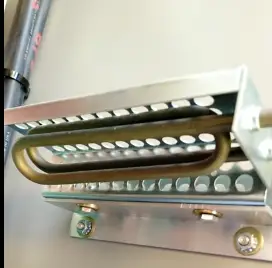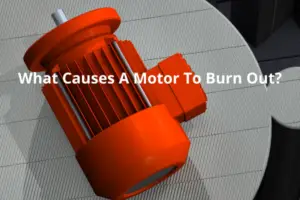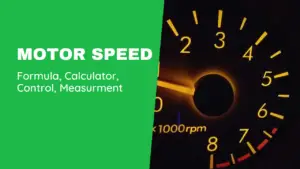Motors are an essential part of many industrial and commercial processes, and they come in many shapes and sizes.
However, one common question that arises when it comes to motors is whether too much current can damage them. The answer is yes, excessive current can indeed damage a motor, and this article will explore the causes and effects of excessive current on motors.
Table of Contents
Understanding Motor Current
Before we dive into the effects of excessive current on motors, let’s first understand what motor current is.
Motor current is the flow of electric current through a motor’s windings, and it is usually measured in amperes (A).
Motor current plays a crucial role in determining a motor’s performance, efficiency, and lifespan.
The amount of normal current that a motor draws depends on several factors, including its size, type, and load.
Typically, the manufacturer of the motor will specify its rated current, which is the maximum amount of current the motor is designed to handle without sustaining damage.
When the motor is operating under normal conditions and within its rated capacity, its current draw should be within this rated current limit.
However, the specific amount of normal current for a motor can vary widely depending on its specifications, so it’s important to consult the manufacturer’s documentation or a qualified expert to determine the normal current for a particular motor.
Causes of Excessive Current in Motors
Excessive current in motors can be caused by a range of factors, including overloading, high voltage, undervoltage, electrical faults, and other factors.
Overloading occurs when a motor is subjected to a load that exceeds its rated capacity, which can cause the motor to draw more current than it is designed to handle.
High voltage can also cause excessive current, as it can lead to increased electrical resistance and heat generation in the motor.
Electrical faults, such as short circuits or ground faults, can also cause excessive current in motors.
For detailed information read my article: Motor Overcurrent Causes, Effect, And Protection
Effects of Excessive Current on Motors
Excessive current can have several detrimental effects on motors, including overheating, damage to insulation, mechanical failure, and reduced efficiency, which can ultimately lead to permanent damage or failure of the motor.
Overheating is perhaps the most common effect of excessive current on motors, and it can lead to the breakdown of insulation materials, such as varnish, enamel, and resin.
This breakdown can lead to short circuits, arcing, and other electrical faults, which can further damage the motor.
Mechanical failure can also result from excessive current, as it can cause stress on the motor’s bearings, shafts, and other components, leading to premature wear and tear.
Reduced efficiency is another effect of excessive current, as it can lead to increased energy consumption and decreased motor performance.
Read my comprehensive article: Don’t Let Electrical Fires Burn You Out: Learn How to Prevent Transformer and Motor Overheating.
Preventing Excessive Current in Motors
Preventing excessive current in motors is crucial for ensuring their longevity and performance. Proper motor sizing is one of the most effective ways to prevent excessive current, as it ensures that the motor is rated for the load it is expected to handle.
Regular maintenance is also essential, as it can help detect and prevent potential electrical faults before they cause damage to the motor.
Voltage regulation is another preventative measure that can help prevent excessive current, as it ensures that the voltage supplied to the motor remains within acceptable limits.
Conclusion
In conclusion, excessive current can indeed damage a motor, and it is important to understand its causes and effects.
Overloading, high voltage, electrical faults, and other factors can all lead to excessive current in motors, which can cause overheating, damage to insulation, mechanical failure, and reduced efficiency.
Preventative measures such as proper motor sizing, regular maintenance, and voltage regulation can help prevent excessive current and ensure the longevity and performance of motors.
By understanding and addressing the effects of excessive current on motors, we can ensure the continued success of industrial and commercial processes that rely on them.
Don’t Leave Empty-Handed!
Install my Free Android App on Google Play:
Electrical Cables Most Common Tables “Cables Tables”
And, my Electrical Calculations App “Fast Electrical Calculator”
Discover more great content by subscribing to My channel
Looking to stay ahead of the game in the world of electrical engineering? Subscribe to my YouTube channel and gain access to exclusive content you won’t find anywhere else!
The staff I recommend
(Amazon Affiliate Links to products I believe are high quality):
- Economy 120 Volt/60Hz AC Power Source – Step-Down Voltage & Frequency Converters 1800W
- UNI-T Digital Multimeter Tester UT139C
- 50-Amp Extension Cord for RV “100ft”
- Voltage Stabilizer 110/220v
- Hair Dryer “best selling“
- TOSHIBA EM131A5C-BS Countertop Microwave Ovens
Disclaimer: This contains affiliate links to Amazon products. I may earn a commission for purchases made through these links.



